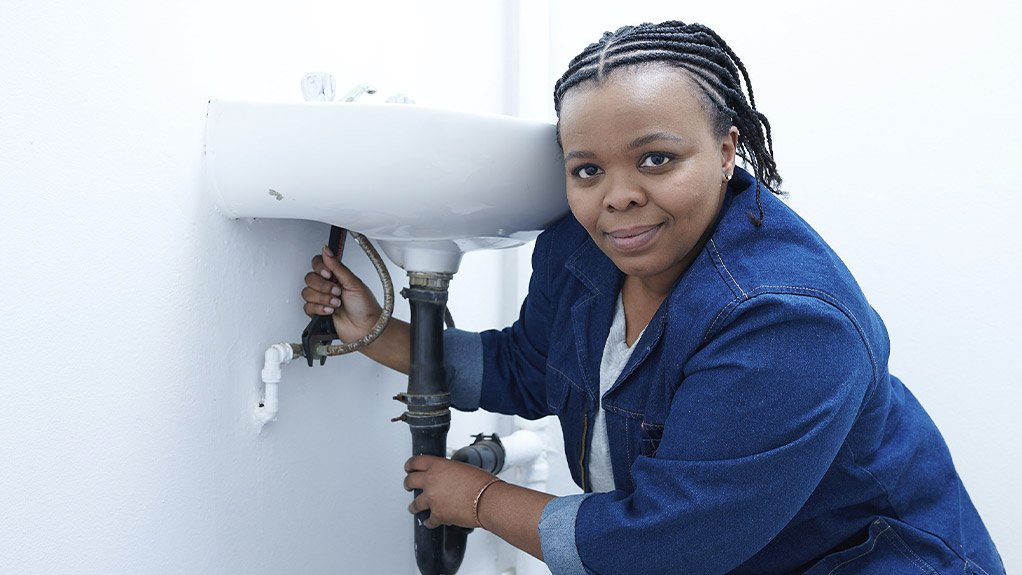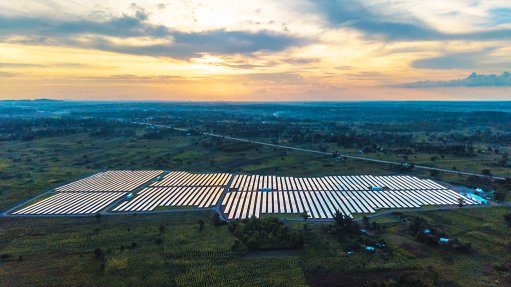Tapping into hidden skills to accelerate plumbing industry transformation


ARPL could be extended to enable more individuals to access decent, secure and better paying jobs in the formal plumbing industry
This article has been supplied as a media statement and is not written by Creamer Media. It may be available only for a limited time on this website.
Artisan Recognition of Prior Learning (ARPL), which officially acknowledges prior learning in terms of registered qualifications and unit standards, can be a highly effective driver of transformation of the formal plumbing industry and the construction sector in general. This is by enabling more skilled and experienced craftspeople operating in the informal plumbing industry to attain a recognised qualification. Through closer collaboration between leading industry bodies, public institutions, education providers and industry, the reach of ARPL could be significantly extended to enable more individuals to access decent, secure and better paying jobs in the formal plumbing industry, while also being afforded the opportunity to grow and develop as professionals and individuals. Roughly 80% of the estimated 100 000 unqualified “plumbers” in the informal sector are black Africans.
Moreover, ARPL has the potential to play an even greater role in helping to address the acute shortage of qualified plumbers in the country, while also supporting the National Development Plan’s target of producing the 30 000 additional artisans a year that are needed for large public works programmes. The existing training and education system is struggling to keep pace with the significant demand for professional plumbers. This is considering the many industrial, commercial, hospitality and residential developments that need reliable and safe water and sanitation services in the country. In 2018, just under 90% of all houses in the country had access to drinking water via tap or pipe located onsite or offsite. Meanwhile, just more than 80% of all South African households had access to sanitation services.
At present, more than 86% of all individuals working as plumbers are not qualified to do so, with more than half of the industry’s total workforce currently operating in the informal sector. Some of these individuals acquired their skills from working in the formal plumbing industry. They left their employers to service property owners who may not want to pay the fees charged by professional plumbers or who are unable to afford these services. In some instances, they are permanently employed by professional plumbing companies and work on an ad-hoc basis in the informal plumbing industry to supplement their incomes. Some individuals work in the informal industry to survive due to limited employment prospects, especially for low-skilled individuals. The very low rates at which these individuals provide their services are unsustainable and compromise both the formal and the informal plumbing industries.
Brendan Reynolds, Executive Director of the Institute of Plumbing South Africa (IOPSA), says that the dire shortage of qualified plumbers and increasing “informality” of the industry have been a long-standing problem. “These issues are threatening the sustainability of the professional plumbing industry and efforts geared at strengthening a trade that plays a key role in providing water and sanitation for health, hygiene and wellbeing. This is in addition to ensuring the efficient use of water and energy. The consumer is also increasingly at risk as a result of these challenges.
Because unqualified plumbers have not completed any formal and structured training, they may not be aware of the latest standards and regulations that pertain to plumbing. This is especially the case in the informal plumbing market where there is usually scant compliance with and enforcement of regulations and standards. Among the many risks associated with poor plumbing workmanship are pipe leaks or bursts which can result in costly damage to property. In extenuating circumstances, entire plumbing systems may also have to be replaced at a significant extra cost to the property owner. This is not to mention the many health and safety risks associated with sub-standard plumbing installations. These include the potential contamination of clean drinking water, spreading of disease, scalding and, in some cases, explosions,” Reynolds says.
Unlike professional plumbers, the informal sector has also struggled to keep pace with the latest industry trends, such as “green” plumbing systems that reduce water and energy use. This expertise is especially important in a water-stressed country that is also grappling with a serious energy crisis. Many professional plumbers have completed training in various “green” plumbing fields. This is so that they are better able to service the high demand for sustainable plumbing solutions, while also honing and expanding their skills to ensure that they are always relevant.
IOPSA and the Plumbing Industry Registration Board (PIRB), the professional body of the South African plumbing industry, continue to promote the ARPL programme. By recognising prior knowledge, skills and competencies through proper assessment processes, ARPL makes it possible for individuals who acquired their learning outside traditional education and training to attain a certification. Conventionally, professional plumbers have completed a 3 year post-matric qualification at a National Qualification Framework Level 4 and the necessary industry-related plumbing training before writing a trade test.
Individuals who have worked for at least four years in the industry can apply to undergo ARPL to attain a qualification. Checklists and phase assessments are used to determine candidates’ readiness to write their trade tests. If limitations in their knowledge are identified, candidates are provided the opportunity to complete gap training. Once candidates have completed this instruction, a technical Portfolio of Evidence can be compiled and used to recommend them for trade testing.
However, the ARPL programme has its limitations. Trade & Industrial Policy Strategies (TIPS), which recently undertook extensive research into the efficacy and the limitations of the ARPL in addressing “informality” of the sector and the shortage of qualified plumbers, has provided recommendations to improve the system.
Among the hurdles identified are the costs involved in participating in the ARPL. This inhibits many self-employed individuals in the informal industry from participating. TIPS, therefore, suggests that the Department of Higher Education and Training (DHET), the Sector Education and Training Authorities and the National Artisan Moderation Body work towards removing the cost of the ARPL entirely. Another alternative is to offer a subsidy or incentive to make the programme more affordable. In efforts to remove the cost barrier, IOPSA, PIRB and Harambee offer fully funded ARPL training with trade tests.
TIPS also suggests that education and skills bodies, TVET colleges, Quality Council for Trades and Occupations (QCTO) and DHET work with industry to find alternatives to the Red Seal QCTO qualification. For example, individuals could qualify to become assistant plumbers. This approach will ensure that skilled individuals in the formal market who do not pass the trade test can still access decent employment opportunities.
Meanwhile, TIPS has recommended that IOPSA and PIRB continue to encourage the formal industry to register unqualified employees for the ARPL. This includes making them aware of the benefits of the programme and the importance of having qualified employees. Although training is beneficial for both employers and employees, some companies are still reluctant to send members of their teams for ARPL. Some employers cannot afford the time it takes for employees to undergo several processes before they are ready to write their trade tests.
There are also companies that do not want to pay the higher wages that qualified employees command. Some employers are also concerned that employees will leave the company once they are qualified to start trading on their own. This means that they will lose skills and incur costs replacing them, while also having to compete against more qualified plumbers in the formal market.
“Both IOPSA and PIRB are proud of the part that we have played thus far in helping to transform the South African plumbing industry through, among other initiatives, ARPL. We have made immense strides in promoting ARPL against the professional designation over the years. However, with the help of other important industry stakeholders, we will be able to ensure that the programme is able to play an even greater role in addressing the ‘informality’ of the profession and dire shortage of qualified plumbers,” Reynolds concludes.
Comments
Press Office
Announcements
What's On
Subscribe to improve your user experience...
Option 1 (equivalent of R125 a month):
Receive a weekly copy of Creamer Media's Engineering News & Mining Weekly magazine
(print copy for those in South Africa and e-magazine for those outside of South Africa)
Receive daily email newsletters
Access to full search results
Access archive of magazine back copies
Access to Projects in Progress
Access to ONE Research Report of your choice in PDF format
Option 2 (equivalent of R375 a month):
All benefits from Option 1
PLUS
Access to Creamer Media's Research Channel Africa for ALL Research Reports, in PDF format, on various industrial and mining sectors
including Electricity; Water; Energy Transition; Hydrogen; Roads, Rail and Ports; Coal; Gold; Platinum; Battery Metals; etc.
Already a subscriber?
Forgotten your password?
Receive weekly copy of Creamer Media's Engineering News & Mining Weekly magazine (print copy for those in South Africa and e-magazine for those outside of South Africa)
➕
Recieve daily email newsletters
➕
Access to full search results
➕
Access archive of magazine back copies
➕
Access to Projects in Progress
➕
Access to ONE Research Report of your choice in PDF format
RESEARCH CHANNEL AFRICA
R4500 (equivalent of R375 a month)
SUBSCRIBEAll benefits from Option 1
➕
Access to Creamer Media's Research Channel Africa for ALL Research Reports on various industrial and mining sectors, in PDF format, including on:
Electricity
➕
Water
➕
Energy Transition
➕
Hydrogen
➕
Roads, Rail and Ports
➕
Coal
➕
Gold
➕
Platinum
➕
Battery Metals
➕
etc.
Receive all benefits from Option 1 or Option 2 delivered to numerous people at your company
➕
Multiple User names and Passwords for simultaneous log-ins
➕
Intranet integration access to all in your organisation


















